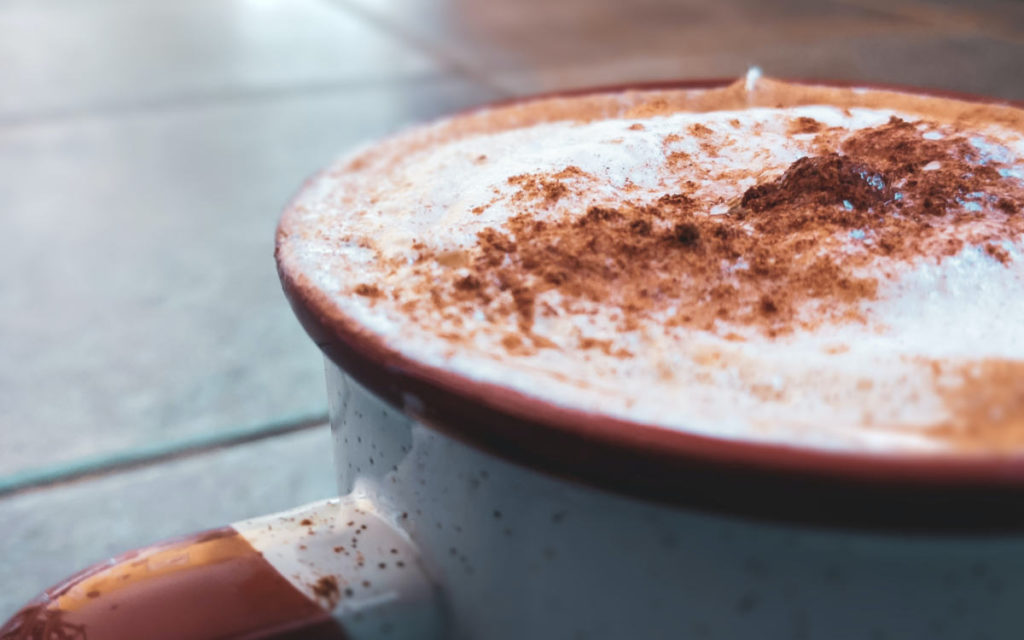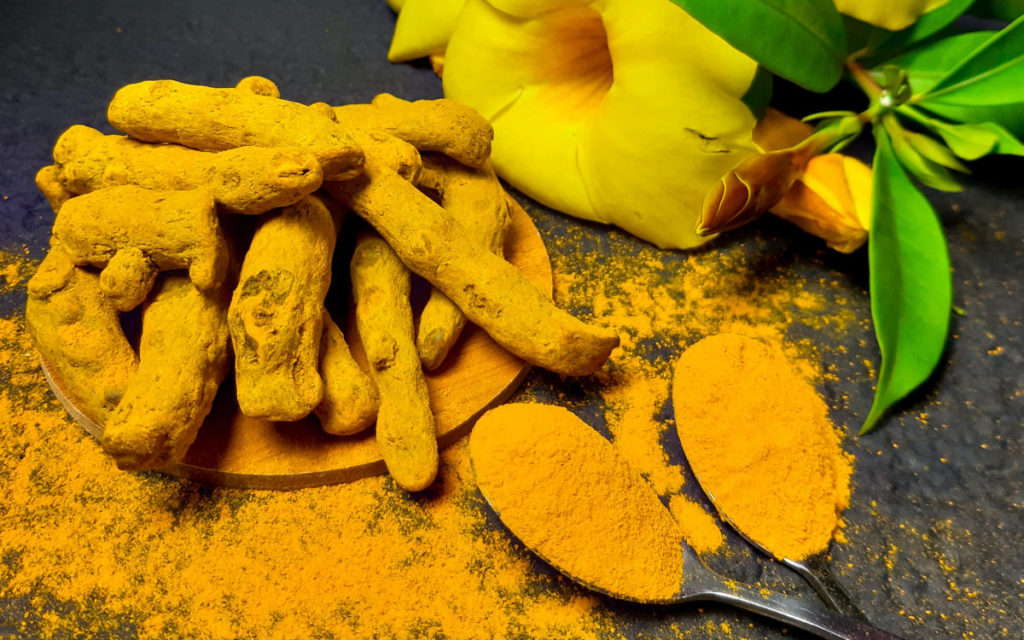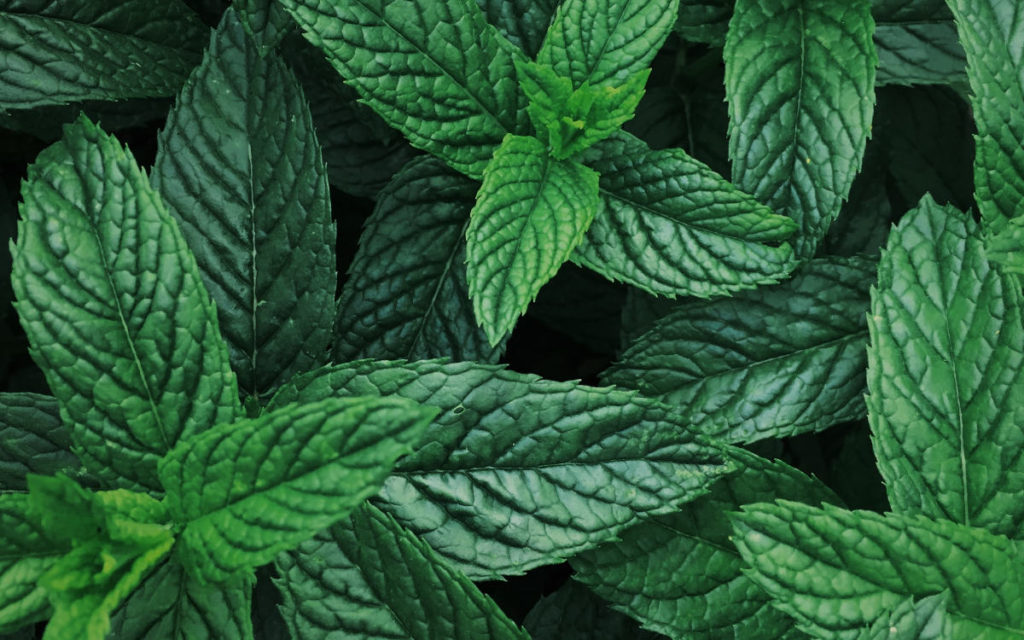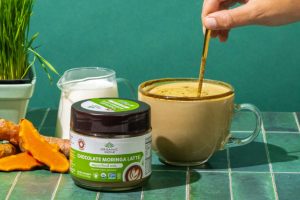

Section

Herbs and spices can support digestion and nutrient absorption, while helping the gut effectively break down food. There are countless medicinal herbs that have been used to support gastrointestinal health across the globe, from India to Peru to the Mediterranean to the Middle East and beyond. Each of the herbs for digestion beholds a different bioactive property that can help bring ease, comfort, and relief to your digestive system and as a result: your whole life!
When your digestive system is functioning at its best, you can experience supported energy levels, immunity, toxin elimination, mental clarity, mood and more. That’s why it’s important to eat a balanced diet, drink plenty of water, lead an active lifestyle, and utilize herbal allies as part of your daily wellness routine.
Herbs for Digestion
Check out the top 11 herbs for digestion, featuring some favorites that you already have in your cabinet, like cinnamon, turmeric, ginger and peppermint. There are also lesser known, but tried and true formulas like psyllium, Turmeric, featuring trikatu, and triphala that are known to robustly support gastrointestinal health and regularity.
1. Cinnamon
Cinnamon, that comforting spice that you know so well, is good for more than just snickerdoodle cookies. Cinnamon has actually been used for its gastrointestinal benefits since 2800 BC. Even the ancient Romans used cinnamon as medicine, specifically for digestive support. Ceylon cinnamon, or “true cinnamon” is native to southern India, and it’s been a longstanding favorite in Ayurveda for calming and maintaining digestive function. Ceylon cinnamon is considered higher quality and more suitable for consistent use than its supermarket counterpart (cassia cinnamon).
How to use: Add ceylon cinnamon to your tea, smoothies, lattes or oatmeal for a medicinal touch. Or you can find supplements available online and in your local health food store.

2. Psyllium
When it comes to herbs for digestion, psyllium is definitely among the best. Psyllium fiber is excellent for simply and conveniently increasing daily fiber consumption. Fiber is known to support gastrointestinal health, healthy elimination and regularity. This plant, from the plantain family, has been used for thousands of years in Traditional Indian and Chinese Medicine. In Ayurveda, psyllium is used to cleanse and detox the large intestines. According to the U.S. Library of National Medicine, psyllium may help the intestines absorb liquid for supported elimination of waste.
How to use: Psyllium can be found in supplement and powder form, the latter of which can easily be added to smoothies, juice, oatmeal, or baked into pancakes and other baked goods.
3. Trikatu
Trikatu is a classic blend of not one but three medicinal spices that are known to help support digestion and gastric function, and is featured in our Turmeric Formula supplement. Trikatu is ginger, long pepper and black pepper, and is used in Ayurveda to stimulate agni, or digestive fire. Ginger is celebrated for its protective effect on the gastrointestinal system; black pepper is found to support nutrient absorption and digestive function; and long pepper has a balancing and detoxifying effect. Together, they help the body break down food in the stomach and intestines. Trikatu actually translates to “three pungents,” which refers to its intense flavor that moves and awakens the body.
How to use: Turmeric Formula features Trikatu, which is typically administered as a capsule, but can also be found as a powder to be mixed with warm water and honey.
4. Triphala
Triphala is another renowned herbal blend that is one of the oldest in the book. It combines three fruits to support the GI tract and digestive system. The featured fruits are amla, bibhitaki and haritaki. Haritaki is known to support healthy bowel movement and gut health; bibhitaki, which translates to “fearless of disease,” brings a gentle laxative action; and amla is full of nutrients that replenish the body. According to the Journal of Alternative and Complementary Medicine, polyphenols in Triphala modulate the human gut microbiome. This balanced formula is great all-around for colon cleansing and digestion and can support regularity.
How to use: Triphala can be found as a capsule or fruit powder to be added to water, smoothies and more.
5. Bael Leaf
If you’re in need of a gentle herbal laxative that works and is safe for daily and long-term use as needed, Bael Leaf is the herb for you. This herb helps loosen the stool, thereby acting as a mild laxative to prevent occasional constipation and promote regularity and healthy elimination. This is contract to senna, which is an herb also used as a laxative, but causes a slew of unwanted side effects like stomach discomfort, gastrointestinal pain, and extreme laxative action, not to mention senna is addiction-forming and unsafe for daily use. Bael leaf is the choice herb in ayurveda to keep things moving through the digestive tract.
How to use: The benefits of Bael Leaf are best and most conveniently enjoyed in supplement form, especially when combined with other digestive-supporting and gut-nurturing hers like psyllium and garden cress.
6. Turmeric
Turmeric has been an herbal medicine champion for nearly 4,000 years. Known as a “pharmacy in one herb,” turmeric played a large role in the Indian Vedic culture since ancient times. While it has a robust range of health benefits, it is most known for its ability to support a healthy inflammation response as well as its positive influence on gastrointestinal health and function. This golden root has made a significant move into modern medicine, with research supporting its ability to support digestion, respiratory function, liver and pancreatic function, joint health and more.
How to use: Turmeric has a vibrant yellow color, and is most commonly found powdered to use in curries. The powder can also be added to smoothies, lattes and baked goods. For a medicinal dose, herbal supplements are best, especially when combined with trikatu for maximum absorption.

7. Fennel
Native to the southern Mediterranean, Fennel seed has been used for culinary and medicinal purposes in ancient, medieval and modern times. In fact, Roman soldiers would eat fennel because they believed it would make them stronger. In Ayurvedic and Traditional Iranian medicine, fennel was long used to support healthy digestion. According to modern research, the gastrointestinal benefits are likely a result of the presence of phytochemicals, which help break down food to be digested and metabolized.
How to use: Fennel seeds can be taken as a supplement, crushed into hot water as a tea or added to hot recipes. Alternatively, the seeds can simply be chewed whole after meals to help stimulate digestion and keep the mouth fresh, as is a very popular practice in India and Italy.
8. Ginger
Another universally familiar herb for digestive support is ginger. Remember drinking ginger ale for your stomach? Well, that remedy goes way back (minus the sugar). Ginger root has been used medicinally in Traditional Chinese Medicine for more than two millennia, and plays an important role in Japanese and Indian medicine as well. In studies by the U.S. National Library of Medicine, ginger has been found to have a protective effect on the GI tract and stimulating effect on the digestive system. This helps soothe and calm the body, and supports healthy elimination for an all-around energetic and vibrant life.
How to use: Conveniently, ginger root can be found in any supermarket (usually near the garlic). It can be cooked into curries, minced with honey and eaten raw, brewed into tea, powdered into smoothies, juiced into concentrates, or taken as a daily supplement capsule.
9. Licorice
Licorice root is native to Eurasia, and its use goes back to ancient Assyrian, Egyptian, Chinese, and Indian cultures. Known best as a flavoring agent, licorice root was also used as medicine for a variety of conditions. Today, licorice is a popular dietary product to help support digestion and soothe the stomach. This is because licorice contains a compound called glycyrrhizin, which may help support a healthy inflammatory response and maintain balanced acidity in the stomach for comfort and relief. When it comes to herbs for digestion, those grandmas who always had licorice on hand had it right.
How to use: Keep in mind, most “licorice” candies sold in the store don’t actually contain licorice, but anise oil because of its similar taste. For its medicinal value, it is best to find pure licorice root in a tea, powder or supplement.
10. Rosemary
Rosemary, that beautifully fragrant herb famous in Italian cooking, is more than meets the nose. The leaves contain beneficial oils that are known to support a healthy inflammatory response and regular gastrointestinal function. This woody herb grows wild all over Italy, and was used in traditional medicine throughout the Mediterranean and beyond. According to the scientific journal Evidence-Based Complementary Alternative Medicine, anti-inflammatory, antioxidant and cognitive support are among the pharmacologically validated medicinal uses of rosemary.
How to use: Rosemary can be enjoyed steeped in tea, infused into olive oil, taken as an herbal supplement, and used in cooking.
11. Peppermint
Fresh and cool peppermint is indigenous to Europe and the Middle East, and was used by ancient Egyptians as a folk remedy for indigestion since 1550 BC. It was also mentioned for its medicinal value in Greek mythology, Roman philosophy, and the Bible. Today, peppermint is utilized in both eastern and western medicine for all things related to digestive support. According to research, the oils have relaxant properties that help support smooth gastrointestinal function. In Ayurveda, peppermint is used for its ability to help stimulate and detoxify the body.
How to use: Fresh or dried peppermint leaves can be used in teas and cooking for every day digestive support. Peppermint oil and leaves can also be found in capsules and soft gels to be taken as a supplement for quick, easy consumption at various dosage.

12. Muña
Muña, also called Andean mint, is native to the highlands of the Andes Mountains. This Peruvian medicinal plant has been used by the people of the Andes since ancient times. In Andean folk medicine, it was used primarily as a carminative to support healthy gastrointestinal function and provide relief. The oils in the leaf are believed to help soothe the stomach and purify the whole body. Muña is frequently consumed in Peru as a tea, especially after a big meal to support digestion. It is also used in a variety of traditional recipes and is beloved for its bright minty flavor.
How to use: Muña is most popularly prepared and consumed as a tea to support digestion. It can also be added to recipes in place of mint, or found as a supplement or powder.
Whether you’re adding some spices and herbs for digestion like turmeric and rosemary to your cooking; creating delicious medicinal smoothies with psyllium or ceylon cinnamon; or making a cooling licorice or peppermint tea, you will likely find protected regularity and relief. Eating a balanced diet with the use of these herbal allies has been considered crucial to digestive health for more than 5000 years. These powerful plants can help you along your path to sustained wellness and conscious living.





